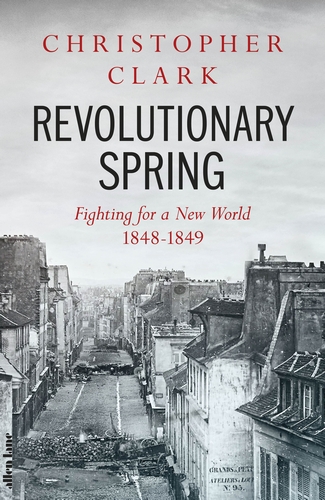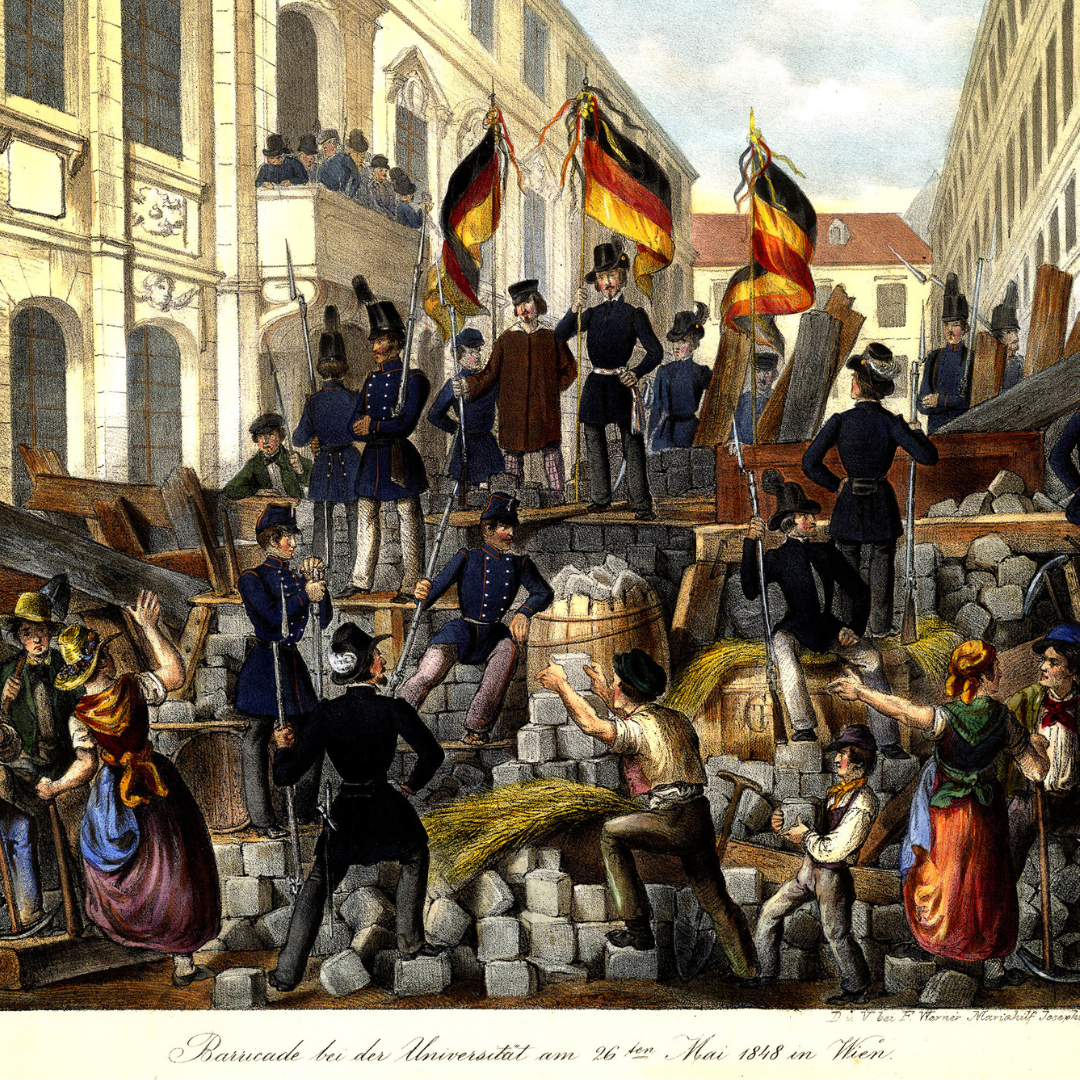A sweeping history of Europe’s revolutionary spring

Published by: Penguin Allen Lane

Christopher Clark, Regius Professor of Modern History at Cambridge, is a master of the concatenation of causes. Sleepwalkers, his 2012 account of Europe’s descent into the First World War, wove together a compelling and rigorous narrative out of multiple strands of causation. His latest book, a mighty 873-page history of the revolution of 1848 displays the same virtuosity—sweeping coverage, mastery of detail, unflagging narrative drive—of a historian working at the height of his powers.
The revolution began, not in Paris as traditional accounts would have it, but in Switzerland and then spread like wildfire to the French capital, then to Berlin, Vienna, Prague, Budapest, Palermo, Copenhagen, Bucharest. Readers from Central, Eastern and Southern Europe will be especially pleased that Clark describes the passage of the revolution through their regions, too often dismissed as peripheral. The lightning spread of ideas, revolutionary tactics, new constitutions, new parliaments, mobilizations of workers and counter-mobilizations of peasantry and aristocrats would be a challenge to any historian. So much is happening at once, Clark jokes, that the operative word for 1848 is “meanwhile”. Yet he manages to hold the threads together in a sweeping narrative that spans a continent. He is also careful to keep analytical strands separate, observing at one point that, while social and economic desperation was a common precipitating factor of revolution, “the geography of hunger in 1845-7” was not the same as the “geography of revolution, 1848-9”.
the revolutionaries of 1848 who questioned the legitimacy of monarchy did not question the legitimacy of empire.
He also covers the abolition of slavery in the French colonies of the Caribbean and charts the influence of 1848 in Latin America, Australia and around the world, demonstrating that 1848 was a genuinely global phenomenon. Global it may have been, but the revolutionaries of 1848 who questioned the legitimacy of monarchy did not question the legitimacy of empire. Liberals like Alexis de Tocqueville who stood for liberal democracy never asked themselves whether a democracy, based on equality and citizenship, could properly make a colony of Algeria. When General Cavaignac put down the workers in the June days in Paris, liberals realized he was using the same brutal methods he had applied on Algerian resistance fighters, and they approved.
Altogether, Clark shows, the liberty that was at stake in 1848 was the liberty of European propertied males. We are not in a mental universe of the now embattled moral universalism expressed in the Universal Declaration of Human Rights of 1948. While women manned the barricades and fought the soldiers in the streets, none of their male colleagues, and few women either, believed 1848 should be a struggle for women’s equality. Jews hoped the revolution would free them from the ghetto and were stunned when emancipation was followed by antisemitic rioting. When the hero of Hungary’s liberal revolution, Lajos Kossuth, toured America in triumph, for example, the anti-slavery campaigner, Wiliam Lloyd Garrison, chided him openly for failing to align the cause of European freedom with the fight against the slave interest in the American south.
Clark combines over-arching analysis and explanation with a ground-level reporter’s skill at narrating events and capturing character with vividness and compassion. The book is filled with extraordinary descriptions of the barricades going up in the streets of Paris, Berlin and Vienna, the chaotic and bloody battles between workers, bourgeois and the forces of order, and throughout the narrative is peopled with vivid characters, like Robert Blum, the poor weaver’s son, then theatre manager, who gets himself elected to the Frankfurt Parliament, joins the revolution in the streets of Vienna and is executed when the forces of the monarchy re-take the city. Many of the figures pop up again and again across Europe as the revolution unfolds. Ludwig Mieroslawski fought in the Polish uprising in 1830, took part in an abortive uprising in Galicia only to show up in the struggle in Palermo, and then in Baden. Joseph Bem also fought in Poland in 1830, served on the barricades in Vienna in 1848, fought on the Hungarian side against the Russians in 1849, and ended up, incredibly enough, once the revolution was defeated, as governor of Ottoman Aleppo. The narrative is full of vivid and consequential female characters, the American writer, Margaret Fuller, who tended to the wounded when the French army attacked the short-lived Roman Republic in 1849, and Marie D’Agoult, mistress of Franz Liszt, who under a male pseudonym, wrote what Clark considers the most perceptive account of the revolution.
Any historian of 1848 is blessed, of course, because the events were witnessed by so many brilliant writers, above all, Karl Marx and Alexis de Tocqueville. Both writers were struck by 1848 as a self-conscious re-enactment of 1789, Tocqueville remarking at one point of 1848 “we had staged a play about the French revolution,” with Marx concluding famously in the 18th Brumaire of Louis Napoleon that what had begun in tragedy had ended in farce. The revolutions failed, across Europe, Marx argued, because the actors of 1848 thought of revolution as a reprise of 1789 and not the modern break with the past that modern capitalism, its class antagonisms and its disruptive technologies had made possible for the first time. Tocqueville thought 1848 failed because liberals like him, who had campaigned for a parliamentary democracy, elected on a narrow propertied franchise, never managed to control the exuberant new demands of the socialists and radicals, who brought the people into politics for the first time. Failing to control the turbulent politics of the street, liberals like Tocqueville, believed they had no choice but to surrender power back to Louis Napoleon and the forces of reaction.
Peasants wore smocks, someone remarked, and “smocks do not obey when a smock is giving the orders.”
One of the surprises of 1848, Clark concludes, was that the conservative anti-revolutionary forces proved more ruthless and resilient than the revolutionaries. Embattled monarchies were able to hold onto the support of rural society, especially the peasantry, who still composed most of the population in every country in mid-19th-century Europe. Here ancient patterns of rural deference played a key part. Peasants wore smocks, someone remarked, and “smocks do not obey when a smock is giving the orders.”
Clark challenges the narrative that 1848 was a failure. It was a revolutionary explosion that changed everything that came after. After 1848, a wise conservative like Bismarck understood, unlike most other conservatives of his class and time, that the Germany he wanted to create would have to have that institution monarchists instinctively hated, namely a parliament. After the enthusiasms of the 1840s, the 1850s were a time of consolidation in which Louis Napoleon built infrastructure—railways, canals, rebuilt Paris under Haussmann—to provide himself with a legitimacy that any leader who had survived 1848 understood was fragile. After the Hungarian uprising of 1848-9, which cost 40,000 lives, Franz Joseph understood that he had to grant at least some of Hungary’s national aspirations in the dual monarchy formed in 1867.
1848 is a lens through which 1968, a revolutionary epoch closer to our times, comes into focus. Both were an explosion of radical hope which left those who lived through it feeling that “to be young was very heaven.” Clark cites the letter of a young German revolutionary who wrote that after hearing about the revolution in Paris, he had to go for a cooling walk in the snow because his heart was beating so hard “it felt as if it were about to blow a hole in my chest.” Somebody in the streets of Paris in May 1968 would have felt the same mad exhilaration. Aging veterans of 1968, now pensioned, retired and looking back fondly at the enthusiasms of their youths, will read Christopher Clark’s magnificent book and feel a strong feeling of recognition.
Michael Ignatieff is Rector Emeritus and Professor of History at Central European University, Vienna. His latest book is On Consolation: Finding Solace in Dark Times.
